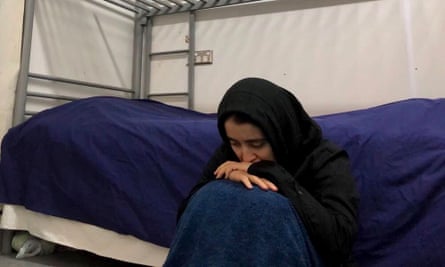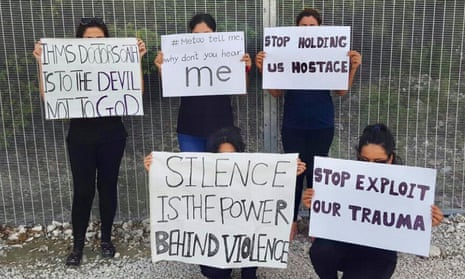Bita* attempted suicide in May, in the grey months while authorities stalled on her medical transfer from Nauru to Australia. It is now more than 10 weeks since two doctors declared her situation “urgent” and warned that delays to the medevac process would be life threatening. She is still waiting.
“For almost seven years, I could put up with all the degradations, but I don’t have the capacity to cope with uncertainty anymore,” Bita, a refugee from Iran, told Guardian Australia. “It is like a slow death for me. I don’t want to come to Australia any longer. My only desire is death.”
The Guardian has interviewed several people on Nauru, each with serious medical and mental health problems. They describe a system where hopes are raised and then dashed by a succession of delays, one that remains at the whim of authorities in both Australia and Nauru.
In Bita’s case, doctors said in April that assessments for chronic conditions were required with the “utmost urgency” because mental health problems were contributing to and exacerbated by her pain. A delay in treatment could see her face “serious irreparable damage including death”, one doctor said.
On 16 May, three weeks after she received the medical opinions necessary for the medevac process, Bita saw a doctor on Nauru. Her medical records show she told the doctor: “I don’t want to live in this situation.”
Four days later, she attempted suicide by overdosing on medication. Later that same day, the Australian government solicitor advised Bita she had been approved by the minister’s delegate for a medical transfer.
Sign up to receive the top stories from Guardian Australia every morning
Nauru won’t accept word of Australian doctors
Australia’s medevac laws require the government to transfer refugees and asylum seekers to Australia if two doctors determine it is necessary and the medical treatment is not available in offshore detention.
In practice, people requiring assessment or treatment must then wait for the outcome of at least three successive decisions – approval from the Australian home affairs minister, approval by the Nauruan Overseas Medical Review (OMR) committee, and for the Australian Border Force (ABF) to schedule transport.
Most recent cases have also required a final “uplift approval” from a senior Nauruan bureaucrat. The aggregation of these steps means critical transfers can take several months to progress.
Nauru, which has banned tele-health assessments, regularly demands a third medical opinion, from a local doctor, before it will consider cases at fortnightly OMR meetings.
Records show Bita and another woman, Shabnam*, were sent to doctors appointed by the OMR committee several weeks after the Australian government approved their transfers. In both cases, the OMR committee took about five weeks to make a decision.

Those familiar with the process say paperwork can take more than a week to arrive after a decision is made.
Last week, a federal court judge excoriated the Australian government for failing to transfer a sick refugee, accusing it of putting its relationship with Nauru above compliance with court orders and federal law.
Justice Debra Mortimer scrutinised a case in which a transfer was approved by the Australian government but was delayed partly because the OMR committee insisted on obtaining its own medical report.
A branch commander within the home affairs department, Peter Timson, told the court that to upset the Nauruans could impede further transfers, and it was therefore “essential … that Australia retains and builds upon its strong working relationships with Nauruan officials”.
Bita and Shabnam were approved by the OMR committee last month, but have remained on Nauru for several weeks. They have not yet been given a date for their transfers.
Government still pushing Taiwan transfers
Yosef*, a 59-year-old diabetic asylum seeker, was offered treatment for a severe elbow injury in Taiwan in June. He declined the offer.
“I’ve been advised that I can go to Taiwan with only one family member,” Yosef said. “I can’t leave my severely sick children and wife alone. They are ill too. How can I accept any treatment while my children are suffering excessively?”
In 2017, the Australian government struck a deal with Taiwan to provide high-level care to sick refugees and asylum seekers – a move broadly viewed as an attempt to prevent people from reaching Australia.
Yosef’s documents show that despite the passage of the medevac laws, the home affairs department continues to direct people on Nauru towards treatment in Taiwan.
His daughter, Hoda*, is the carer for her ill parents. She suffers from fatigue, chronic stress disorder and back pain. As the population of women on Nauru declines, due to some taking up resettlement offers and others being sent to Australia for treatment, those remaining say it has become increasingly unsafe.
Hoda complained about wild dogs roaming near her residence. She complained of heart palpitations and severe chest pains due to a fear of “the island and its people and its animals”.
Baran* is also in the process of seeking a medical transfer and is seeking reports from doctors. Because of a backlog of critical cases, she has been on a waiting list for seven months for a case worker to assist with the process. Since 2013, Baran has suffered from gynaecological issues and urinary incontinence. She is one of several women on Nauru with similar conditions.
Baran said she previously slept in a bed about two tents away from the toilet – a distance sometimes too far for her to make it in time. Instead, she urinated into a mug and then walked to the toilets to pour it out.

‘This is not a nightmare anymore, it’s reality’
Last year, Medecins Sans Frontieres warned Nauru was in the grip of a mental health crisis and released findings that showed 60% of people in detention on the island had had suicidal thoughts.
“The mental health suffering on Nauru is among the most severe MSF has ever seen, including in projects providing care for victims of torture,” the report found.
MSF Australia executive director Paul McPhun has described the medevac law as “a desperate measure for a desperate situation”.
“Our politicians should know, and the public needs to know, that the health crisis on Manus and Nauru is real,” McPhun said.
“The mental and physical suffering of the human beings trapped by Australian policy is real. The need to urgently act to stop this unnecessary suffering is real.
“Our experience during 11 months working on Nauru showed that people there were experiencing life-threatening mental health needs. We saw that there was insufficient independent medical care available on the island to cope with the levels of need.”
Having jumped through every hoop, Bita remains in limbo. Even after her transfer was approved by Nauru’s OMR committee, she has spent another three weeks waiting for the ABF to advise her of her transfer date and a flight off the island.
In the meantime, she has grown increasingly frustrated and isolated.
“Since majority of women have been transferred to Australia, Nauru has become an unsafer place for women,” she said.
“My home is surrounded by the stray dogs. I’m endlessly fear. I have the illusion that a cat gazes at me. This is not a nightmare anymore, it’s reality – everyone is gone and we are the ones left.
“No one hears us because we are not a big group anymore. I have nightmares that dreadful animals are attacking me and I’m always running away, waking up to the feeling of suffocation.”
* names have been changed.
